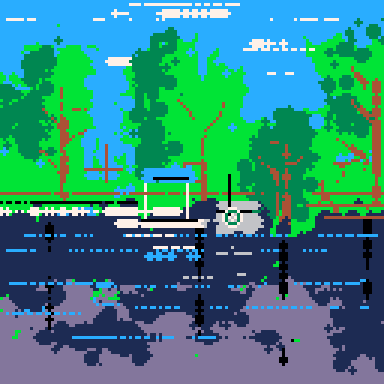I'm very fond of this idea of a fantasy console, and I'm enjoying Pico 8 a lot. Every so often, I think, gee, I'd like one with fewer constraints.
But then something dawned on me: There must be a point beyond which, if constraints are relaxed too far, the point of being a fantasy console evaporates and you may as well be simply using a more generic game framework.
I imagine this has been discussed many times before. But it explains to me why we will probably not see an extremely large proliferation of fantasy console software, the reason being that it is the constraints that make it unique as a console. If we make something as powerful as say protected mode DOS and make it a fantasy console, users may as well either use Dosbox or just write a game with a modern game framework, because the constraints are so relaxed relatively speaking. The craft of fitting a game idea into constraints is gone.
I'm aware of Liko 12 and PixelVision 8 and TIC-80 and so forth. The point of my discussion here is just a thought experiment about how much folks would value something that's a lot more powerful---where at that point there's really no need to have it be a console.

I really like PICO-8 because of both the restrictions and the well-integrated tools.
It's not just a platform for retro games, there's no shortage of that, it really is a fantasy console.
And it's a fantasy console that harkens back to a very particular time in computing history. A point in time where even a child could pick up coding in an weekend, but it was possible to make amazing things.
A fantasy 286 or something wouldn't have the same magic to me. The complexity would go up dramatically, and using it would start to feel too much like work.
... but at the same time PICO-8 manages to integrate some modern touches that keep the spirit of the 8-bit era but eliminate frustrations of that era. LUA instead of BASIC, for example.
Lexaloffle has done an amazing job isolating the essence of what made the 8-bit era a golden age of people having fun while coding, but also not getting bogged down in pointless realism.

Yeah! I think it's fun that they force everything to capital letters with the Lua integration and that Lua actually has one or two, vague similarities to BASIC such as IF .... THEN. Obviously the rest of it is not too similar. But the lack of syntactical ceremony makes it similar to BASIC, and I imagine very approachable by beginners. It's kinda like Python (I'm new to Lua), I think.

There's a lot to love in Pico-8, but at this point, I think it's ultimate strength is that the community has hit a critical mass. This will make it very, very hard for any other console to catch up. Pico-8 has so many games to enjoy and learn from. There have been some zine issues, some podcasts, even a book in progress! I think any other product similar enough to scratch the itch that Pico-8 scratches would be too similar for the majority of people to bother switching over.

The "feature" of Pico-8 that stands out to me, and what I always point out when preaching to others, is how quick you can get started and see a result.
You don't have to setup folders or assets or libraries or anything like that. You just start programming and you get an immediate result. That direct (manual) programming can be a hurdle, I suppose, but it's a lot easier to explain (and copy from snippets) than it is watching a 20-minute video on how to setup your environment.
That quick feedback is a huge reason I keep coming back to make games. I can get into actually making my game very quickly...which is a huge sell when showing people too.

Agreed!
Computing had lost that simplicity! Back when people had an Apple 2 or a Vic-20, they could start coding about three seconds after turning on their machine.
The problem is, those machines were terrible.
Somehow Pico-8 gives us the simplicity, but not the terribleness.

To answer the question: because it is incredibly polished.
Everything works perfectly, everything is in the right place and the cohesion of every bit is amazing.

I love the feels, But am also torn about what extensions, Whether to our LUA toolkit or the restrictions themselves, Would do to our beloved console and then had an idea..
Looking at older systems in the physical world, Sometimes the carts themselves or parts of the hardware had mods that could be done or special roms or cpus added to the cartridges or expansion modules that would increase the functionality, Some would take advantages of tweaks in the hardware that were undocumented, Others would lower or remove one feature of the system and free up resources for a hardware sound or graphics trick..
Still other developers themselves found tricks in the hardware to pull off uncanny feats of software wizardry or tweaks with the code.
We already have tweaks and clever wizards about the Pico-8 community, But what if we had those people in ADDITION to the option of picking one or two 'expansions' when booting up a cartridge?
Extra 'ram' for your tiles or maps or sprites.. Maybe a graphics 'hack' that would use the map or other space to pull off more 'colors' sort of like the existing software 'flicker' trick?
This way Pico-8 could still be a unique fantasy console and yet offer expansions without ruining it by being too 'open'.
EDIT: In software terms, Think of people using the extended LUA toolkit to write 'expansion roms' sort of like DLL libraries.
EDITEDIT: Think third-party modules for the C64 and AMIGA you'd see in magazines from clever hardware people making expansions in their garages. X3

I think hardware hacks are supposed to be emulated by writing javascript that takes advantage of the GPIO "pins" in the web player.
(Or by making actual hardware that plugs in to the GPIO pins on Pi or CHIP.)

The problem there is that checkboxes in a configuration utility are free, unlike real real after-market hardware. There's little reason for anyone not to use the full possible feature set.
It's, like... PSP emulators offer a CPU overclock, which mostly works because the clock rate wasn't a constant on a PSP and so emulating cycle-for-cycle doesn't lock you down like it would on a C64 emulator. So everyone turns on the overclock, because... why wouldn't you? :)
The only time such a limit would work well for pico-8 is in a jam/compo where there were specified requirements for entering, just like we've done for 140-character source code in tweetjams.

@Felice This is why you limit the expansions as well as the amount of them active. If it weren't attractive to people as an option, The.. COUGH.. Other vc's out there wouldn't also have the option to impose limits themselves.
Either way, There are other options I mentioned that had rl counterparts that would disable one feature entirely to double the output of another.
Just some ideas that would satisfy both crowds, Not to mention people who aren't up to designing a full game could thereby develop 'technologies'' that other people could use n' pass around just as you would the carts themselves.
Edit: For instance you might build a ridiculously complex dungeon-building engine with autotile function and end up using 90% of your tokens.. A dungeon engine on a 'rom' would lessen the data use but still allow the creator to focus on their game and assets.

I suppose that's true, but I'm not sure we're talking about the same kinds of add-ons, so we're probably talking at cross-purposes then.
BTW for a rather interesting take on limited resources as an actual gameplay gimmick, I recommend taking a look at NieR: Automata. It wasn't the best game, honestly, but I quite liked how they handled upgrades and how the system actually blurred the lines between game and gamer.

Obviously, someone needs to make a way to connect a tape-deck to the GPIO pins, so that extra tokens can be stored on audio tape.

I realize this question was asked in 2017.
I for one would love different generations of Fantasy Console.
Why couldn’t we have a SNES Era Fantasy Console?


I mean...you could totally make any fantasy console you could imagine. But...if what you can make in it requires weeks and weeks or months and months of effort to make art and music for it and megabytes of disk space to store it (I'm thinking of building a substantial SNES game), why house your game in a console and not just an arbitrary 2D game framework like Love2D? The point of it being a console is gone. With PICO-8's constraints, the games made in it have an extremely distinct and instantly recognizeable personality. TIC-80 already begins to lose this because the palette can change for instance. PICO-8 really hit on something---very difficult to imagine any other product doing quite the same thing in the same way and developing a community quite like this one. It's utterly fascinating.

I think "why house your game in a [fantasy] console and not just an arbitrary 2D game framework like Love2D?" gets to the core of it. It makes me think of zep's PRACTICE 2018 talk and how clear that makes it that PICO-8's limitations are designed for deliberate artistic effect: PICO-8 is the way it is precisely in order to make the carts made in it the way they are.
I don't think a fantasy console has to be limiting to the same extent as PICO-8 to be distinctive and inspiring like PICO-8 is, but I don't think any of them will end up there if they don't aim for it deliberately.

Yes, I agree, which is why I think of PICO-8 both as a philosophy as well as a tool.
In my experiments with the tool that is PICO-8, I ran into the following issues:
- there is no purple color (I want to make purple art)
- there is not enough map editor ROM to design many levels (I want to design many levels)
- there is not enough RAM to procedurally generate worlds (to work around the above issue)
I can work around limitations, but there inlies the problem: it takes work to work around them. What PICO-8 represets to me, as a philosophy, is the elimination of pointless work. It's a self-sufficient package for making games. All the basics are done for you. There's no configuration. No setup. You don't need to create windows, rendering contexts or event loops.
Most game engines require this. You can't even start doing anything before you "create a project". You need to write boilerplate code. You need external applications to draw sprites and make music.
TIC-80 is like PICO-8. A standalone package where everything is taken care of and you can just start creating. BUT, it lets me have purple. It lets me design many levels. It has enough RAM to generate whatever I want.
I love PICO-8 for the philosophy, and also the community. But the tool falls a little short. Without getting into hacky shit with compression algorithms and external tools to import such custom data into map ROM and what have you, you can't make anything more than the simplest arcade games.
For some, this is apparently a blessing? For me, it's annoying.
I've been making games for years. I didn't stop because they grew in scope. I stopped because the tools just weren't there to eliminate pointless work. And now.. the tools have come! And I'm ecstatic! TIC-80 hits my sweet spot. It's just as simple and easy as PICO-8, but without those strangling restrictions outlined above. However it might not even exist if it weren't for Zep's first move! That's why I love PICO-8. And who knows, I might still use the tool in certain situations.

-nods!-
The point is looking at your tools as part of your process, maybe. Going, when you can, beyond "I know how to use this" and "I have access to this" to "this will help me make art I want to be making".
I think the best fantasy consoles are going to be the ones that do that.

I've tried a couple of other fantasy consoles, and while I've liked them, I couldn't really bring myself to actually use them.
Developing for Pico-8 is a game in and of itself.
If you relaxed the restrictions until they're easy to work around, it gets to a point where I wonder why the restrictions are there at all. Why not ditch the fantasy console conceit, and just use a tool like Moai, or Love2D, or any of the many others I can't think of off the top of my head?
That's my answer to the original question : Pico-8 stands out because it's a game. A fun, well balanced game.
It's like 'Guitar Hero', except you don't play as a rock star, you play as a game programmer from the 80s.

For me, personally, and this is an opinion I've yet to see anyone else have, It's not at all about the limitations. A Pico-8 with no token limit, 64 pages of cart space for the graphics, map, and sound (ie, same as normal Pico-8 but you can swap between them in-game like NES mappers), having a wider selection of colors, etc, I would love more than normal Pico-8.
So then, why not jump over to an alternative that basically has all of those things? For me, It's because Pico-8 as a whole is like Littlebigplanet. I've spent way too much of my life just making things in LBP2 and 3, messing around with the logic system especially, and just being creative and see what I can come up with. And it had a pretty similar community to the BBS, although quite a lot larger.
Pico-8 has the same magic. Just instead of making fun little levels or minigames or just messing around with whatever else, I'm making a little 8-bit game from scratch with the same feel, to ship it off to a similar community. Pico-8 is easy to use, fun to use, lets you make whatever you dream up, and has a community where other people will actually see it. Maybe gets in your way now and then, and LBP did too, but really, that's just forcing you to be more creative.
I've tried several other fantasy consoles, and none of them have the same feeling to me. Pixel Vision 8 is the one i spent the most time with, and I didn't care for it. There wasn't much of a community, it felt less comfortable to work with all around, it wasn't as polished, and most importantly, it didn't really have that sandbox-ish feel to it that Pico-8 does. That's all just me though, I totally get the whole limitations thing, I'm just more here because Pico-8 to me is like LBP and SmileBASIC combined.

i have a little aspect thats not mantiont that gets me into pico8. its the option to make a hardware-raspberry-console. i din't find anything thats so simple to make a game and a physikal console. i work with kids in hardware classes and its amazing what you can build. we build an arcade with "floppy-roms" thanks to an idea from this great comunity. there is no other systhem that so simple and little enought to work on a pi-zero. the limmits gave this option. i can't thank enough. thanks to the developer to the comunity(it's a big part. . . every day there are more interresting games... it's great)
sorry for my english

@apLundell I'm looking at 'getting started' with Love2D:
> To make a minimal game, create a folder anywhere, and open up your favorite text editor. [...] Create a new file in the folder you just created, and name it main.lua. Put the following code in the file, and save it. [...] the easiest way to run the game is to drag the folder onto either love.exe or a shortcut to love.exe.
That's a lot of cruft before you even start.
With PICO-8? Well, I start PICO-8. Then I press Esc for edit more. That's it. Ctrl+R to see whatever I make in action.
The difference is crystal clear.

Not that clear.
The sentence "Put the following code in the file" sounds pretty crufty ... if you cut it off exactly there. But in-context, the "following code" was a Hello World program.
That sentence was not describing boilerplate that it recommends you routinely copy/paste.
In fact, taken as a whole, that paragraph explains that all you need to do to make a Love2D program is to write a line of code in a text file, and then save it.

"[For PV8...] There wasn't much of a community, it felt less comfortable to work with all around,"
A big part of that is the Pico8 was here first, but I think the limitations contribute to that feeling as well.
In a limited playground like Pico-8 (Or Little Big Planet), even games made by the most talented pros feel like they're within reach of an enthusiastic beginner.
If a few of the games on the BBS had fifty megabytes of gorgeous full-color 4k art, or a custom engine with 700,000 lines of code ... well it wouldn't feel like that anymore.
[Please log in to post a comment]
















